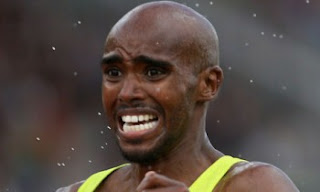From Lets Run
There are many reasons to respect Farah's decision to move to a new environment, particularly off the back of a relatively successful 2010 season, and so close to the 2012 games. He's really pushing to win, and willing to takes some risks to do so, rather than being happy being the best Brit, and perhaps otherwise being off the pace at the sharp end, and out of the medals.
A successful athlete making a change to keep progressing is interesting and noteworthy and shows no complacency - interestingly in my experience many of the top athletes in triathlon are surprisingly complacent. Many are happy to be around the best in their countries even if they are not winning or close to the podium. Despite not achieving at the very highest levels - every athletes dreams of standing on the top of the podium - too few are willing to change in order to reach the top. So they stay stuck where they are, in some ways settling, as change is hard, risky and unknown.
Farah is a great example for any athlete - if you're not winning*, what do you have to lose by changing?
*Even if you are winning, continuing to do the same thing for too long is a sure way to let the competition catch up to you.
"I just want to be the best I can be. And I'll do whatever it takes to be that. I could have been really comfortable where I was in Teddington, nice house, family, friends, watching the Arsenal. But if you want to win medals, then you have to do whatever is necessary. Every second counts. One, two per cent could make a difference. I went to the US to find those percentages. People say don't change when things are going well, I felt the opposite. And it's worked."
- Britain's Mo Farah, who is a perfect 10-for-10 after moving to the US to be trained by Alberto Salazar.Also posted by Dr Sousa
There are many reasons to respect Farah's decision to move to a new environment, particularly off the back of a relatively successful 2010 season, and so close to the 2012 games. He's really pushing to win, and willing to takes some risks to do so, rather than being happy being the best Brit, and perhaps otherwise being off the pace at the sharp end, and out of the medals.
A successful athlete making a change to keep progressing is interesting and noteworthy and shows no complacency - interestingly in my experience many of the top athletes in triathlon are surprisingly complacent. Many are happy to be around the best in their countries even if they are not winning or close to the podium. Despite not achieving at the very highest levels - every athletes dreams of standing on the top of the podium - too few are willing to change in order to reach the top. So they stay stuck where they are, in some ways settling, as change is hard, risky and unknown.
Farah is a great example for any athlete - if you're not winning*, what do you have to lose by changing?
*Even if you are winning, continuing to do the same thing for too long is a sure way to let the competition catch up to you.


I had a recent conversation along similar lines with Coach Krueger. I was, personally, nervous because I was already performing at or slightly above the level I was at when I won Ironman Canada in 2009. The prospect of venturing into "unknown" territory was frightening. But Krueger reminded me of a couple things. The first is that the level required to win IMC is not the same as the level required to win in Kona, The second was that the only way to learn what you are really capable of is to take some, and he hesitated to use the word, "risks," because his point was not to be foolish, but to be willing to see what you are really capable of.
ReplyDeleteHe summed it up quite simply. "Andi Raelert went 7:41. Why shouldn't you go faster?"
Ryan Lochte is the most recent example, to me, of this attitude. Everyone said that the rubber-suit records would stand for eons. But Lochte has broken two WRs (one SCM and one LCM) since the rubber suit ban was instituted.
I think we all need to feel that we have "more fast" left to find. Ato Boldon said that every sprinter believes that one day, a man will run the 100m and at the finish line, the clock will read - 0.0. Maybe we all need a bit more of that. And we need to go looking for the ways to find it...